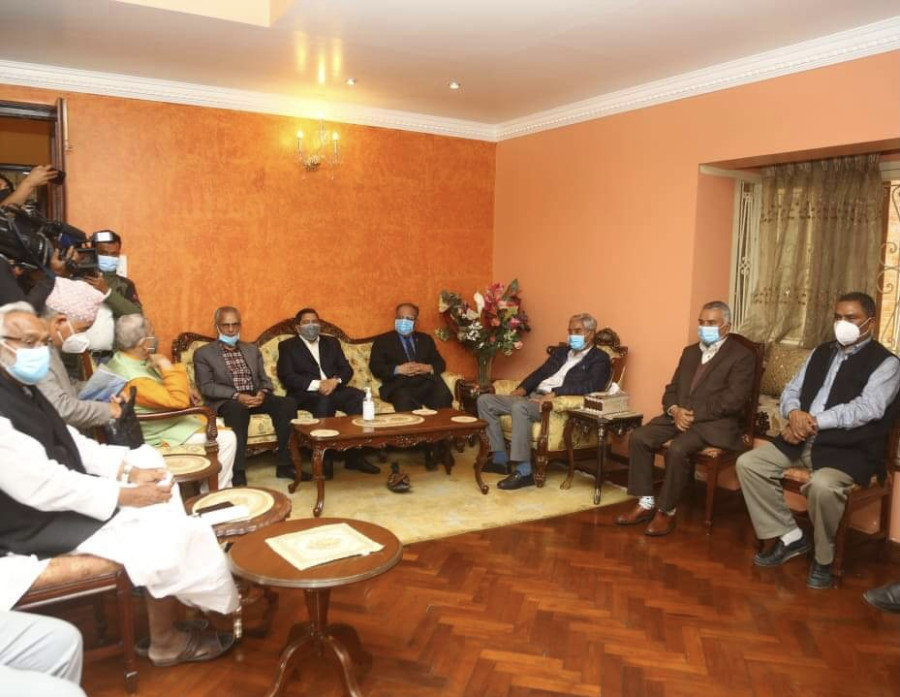Politics
Janata Samajbadi seeks time to decide and politics is stalled again
Three parties finally meet to discuss unseating Oli. Nepali Congress and Maoist Centre agree to join hands, but the fourth largest party wants to wait for Oli’s response.
Binod Ghimire & Tika R Pradhan
Politics is back to square one.
Top leaders of Nepali Congress, Communist Party of Nepal (Maoist Centre) and Janata Samajbadi Party finally met for the first time on Friday since the Supreme Court on February 23 reinstated the House of Representatives.
The agenda was to build an alliance to unseat Prime Minister KP Sharma Oli.
But there was no concrete outcome as the Janata Samajbadi Party said it needed more time to discuss the proposal.
“This is the first time the Congress made a proposal,” said Mahantha Thakur, chair of the Samajbadi Party. “We need to discuss the issue in the party’s meeting before coming out with any position on forming an alternative government.”
The three parties jointly control 142 seats in the 275-member House of Representatives, enough to unseat Oli. But without the support of the Janata Samajbadi, with its 32 seats, Oli cannot be ousted.
The Maoist Centre, however, agreed on the proposal to replace Prime Minister Oli with Sher Bahadur Deuba, president of the Nepali Congress, the main opposition in Parliament.
“Congress President Deuba asked about our view in unseating Oli. We said the Maoist Centre is ready to form an alliance of democratic forces for the formation of a new government,” said Narayan Kaji Shrestha, the Maoist Centre spokesperson. “We will withdraw support to the government very soon.”
The Oli government still has the support of the Maoist Centre which the latter gave the CPN-UML in February 2018. The two parties had merged to form the Nepal Communist Party (NCP) in May 2018 but the Supreme Court invalidated the merger and revived the constituent parties on March 7 with its ruling on a petition by Rishiram Kattel, whose Nepal Communist Party was already registered at the Election Commission.
The Maoist Centre has 49 seats in the lower house as four of its lawmakers have been relieved of their positions after they defected to the UML.
The Oli-led CPN-UML has 121 votes in the House and with the support of the Janata Samajbadi Party it can continue to lead the government.
“The Maoist Centre accepted the proposal and assured to withdraw the support to the government the day the Janata Samajbadi Party agrees to form an alliance against Oli,” Prakash Sharan Mahat, deputy general secretary of the Congress, who was present in the meeting, told the Post. “However, there was no concrete answer from the Janata Samajbadi Party.”
Congress President Deuba had called the meeting of the three parties after widespread criticism in his party and outside that he wasn’t willing to replace the Oli government. Following pressure from the Ram Chandra Poudel faction, the Nepali Congress last week had decided to start negotiations to form an alliance to oust the Oli government.
But during the meeting, the fourth largest party in Parliament reiterated its stance that releasing Resham Chaudhary, a member of the lower house jailed for his involvement in the 2015 Tikapur riots in which nine people were killed, and withdrawal of 208 other cases against its leaders and cadres was its bottom line to extend its support. It has also said it wants amendments to the Constitution to address its longstanding political demands in return for extending its support.
The leaders of the party didn’t hide the fact that they have been negotiating with the Oli government to get its demands met.
A five-member task force with two members from the Samajbadi Party and three from the government has been holding talks on the demands.
Rajendra Mahato, a senior leader, said the party would wait some time for the Oli government to address their concerns before giving its word to the Congress concerning the formation of a new government.
He said that the party has already had a bitter experience with Deuba and Maoist Centre chair Pushpa Kamal Dahal regarding its demands.
“Both Deuba and Dahal did nothing towards releasing our leaders when they were prime ministers,” Mahato told the Post. “It would be welcome if the incumbent government delivers.”
Dahal was prime minister from August 2016 and Deuba, who succeeded him in June 2017, was the prime minister till February 2018.
But the Samajbadi Party is a divided house with the Thakur and Mahato faction wanting to join the Oli government while Upendra Yadav, party’s other chair, and Baburam Bhattarai, chair of the party’s federal council, are for forming an alternative government.
Without assurance from the Janata Samajbadi Party, the Nepali Congress and the Maoist Centre don’t want to file a no-confidence motion as the Oli government would get a life for one more year if the motion doesn’t get through the lower house. Article 100 (4) of the constitution says if a no-confidence motion, which can be filed two years after a prime minister is appointed, fails, another similar motion cannot be filed for another year.
But despite Friday’s talks being inconclusive, it is a step forward, leaders said.
“It is positive that the Congress has finally taken an initiative to form an alternative government,” said Dev Gurung, chief whip of the Maoist Centre. “Now the ball is in the Janata Samajbadi’s court. Its move will determine the future course of the country’s politics.”




 13.12°C Kathmandu
13.12°C Kathmandu















